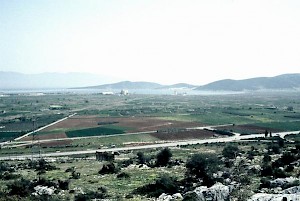Diodorus on the foundation of Halos

In the autumn 304, Demetrius I Poliorcetes invaded Greece, where he liberated the towns that were garrisoned by Cassander. Two years later, the two kings faced each other in southern Thessaly (between modern Almirós and Soúrpi), but no battle was fought, because both sides knew that the real decision was to be made in the battle between Antigonus Monophthalmus and Lysimachus. (This rationalism is typical for warfare in this period.) After some time, Cassander and Demetrius concluded an armistice. The story is told by Diodorus of Sicily.note The translation was made by Russel Geer.
The lasting result of the non-battle was the refoundation of Halos, which had been destroyed in 346 by Parmenion, one of the generals of the Macedonian king Philip II. In 302, the population was permitted to return, and they rebuild their town in the old camp of Demetrius ("old" Halos was a bit more to the east).
[20.110.1] In Greece Demetrius, who was tarrying in Athens, was eager to be initiated and to participate in the mysteries at Eleusis. Since it was a considerable time before the legally established day on which the Athenians were accustomed to celebrate the mysteries, he persuaded the people because of his benefactions to change the custom of their fathers. And so, giving himself over unarmed to the priests, he was initiated before the regular day and departed from Athens.
[20.110.2] And first he gathered together his fleet and his land army in Chalcis of Euboea; then, learning that Cassander had already occupied the passes in advance,note he gave up the attempt to advance into Thessaly by land, but sailed along the coast with the army into the port of Larisa.note Disembarking the army, he captured the city at once; and taking the acropolis, he imprisoned the garrison and put them under guard, but he restored their autonomy to the people of Larisa.
[20.110.3] Thereafter he won over Antrones and Pteleum, and when Cassander would have transported the people of Dium and Orchomenus into Thebes, he prevented the transplanting of the cities.note But when Cassander saw that Demetrius' undertakings were prospering, he first protected Pherae and Thebes with stronger garrisons; and then, after collecting his whole army into one place, he encamped over against Demetrius.
[20.110.4] He had in all 29,000 foot-soldiers and 2,000 horsemen. Demetrius was followed by 1500 horsemen, not less than 8,000 Macedonian foot-soldiers, mercenaries to the number of 15,000, 25,000 from the cities throughout Greece, and at least 8,000 of the light armed troops and of the freebooters of all sorts who had gathered for the fighting and the plundering; so that there were in all about 56,000 foot soldiers.note
[20.110.5] For many days the camps were pitched opposite each other, and the battle lines were drawn up on both sides, but neither came forward into battle since each was awaiting the decision of the whole matter that would take place in Asia.note Demetrius, however, when the people of Pherae called upon him, entering their city with part of his army and taking the citadel, dismissed the soldiers of Cassander on terms and restored their liberty to the people of Pherae.